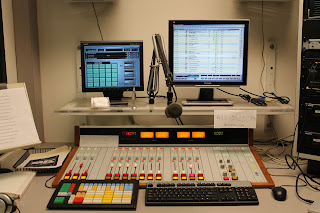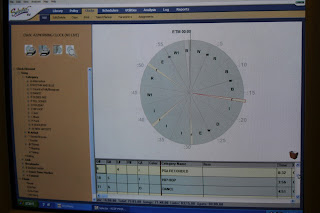KCSF at City College of San Francisco (Photo: J. Waits)
I pride myself on my vast knowledge of college radio and thought that I was particularly schooled in all of the local college radio options in my home town of San Francisco. I even went so far as to proclaim that there were only two college radio stations in the city of San Francisco (KUSF and KSFS). Well, a few weeks ago I found out that I was wrong.
Broadcasting at City College of San Francisco (Photo: J. Waits)
An email came through my inbox that mentioned KCSF at City College of San Francisco. Instantly intrigued, I quickly got in touch with the station's Program Director Matias Godinez in order to arrange a visit. On September 14, I walked over to City College in order to learn more about this mysterious online radio station. Godinez acknowledged that the station is growing, but that "most people have never heard of us."
KCSF Studio (Photo: J. Waits)
Godinez has been a student in the radio department for 2 years and prior to that had college radio experience at KDVS at University of California at Davis (he was the host of a sports talk show) as well as commercial radio experience. He told me that KCSF serves as a training ground for students in the digital radio program in the Broadcast Electronic Media Arts Department at City College. Students have an opportunity to either take classes in the department or join KCSF's Radio Club. As students learn about radio they are asked to volunteer in various station departments, including news, sports, promotions, public affairs, and production. Godinez said that KCSF is "here to teach students," but he also said that DJs have a lot of "freedom for the most part."
DJ on the air at KCSF (Photo: J. Waits)
KCSF has live programs Mondays through Fridays and is only able to have live DJs when their building is open and staffed (9am to 9pm on Mondays through Thursdays and 9am to 4pm on Fridays). In part because City College is a two-year community college, the student population is quite diverse and there are many international students. Godinez estimated that there are approximately 20 people volunteering at the station at a given time, with about 7 or 8 holding management positions.
KCSF (Photo: J. Waits)
KCSF has made some advancements in the past year and everyone I spoke with was excited about the station being added to lineup of online radio stations on TuneIn. Godinez was also proud of the station's sports broadcasts. He told me that they've used UStream to air live football and basketball (men's and women's) games recently. In the works for future broadcasts is the possibility of adding a video simulcast.
Digital Radio Certificate from City College (Photo: J. Waits)
Another recent accomplishment was a collaborative broadcast on September 10 with local public/community radio station KALW. A live discussion that focused on economics of education and the future of City College took place in a theater on campus and aired live over the KALW program "Your Call" as well as on KCSF.
Records from KCSF's past (Photo: J. Waits)
I'm always interested in learning more about the history of radio stations, so I was curious to find out how long KCSF has been in existence. Logos for the station include a reference to 90.9 FM, so I wanted to find out more about how it achieved FM broadcasts. In order to get the back story about the station's past, I made a return visit on September 19 in order to speak with Dr. Cecil Hale. Hale has been a tenured professor at City College and the General Manager at KCSF since 1986. Hale referred me to the chair of the Broadcast Electronic Media Arts Department, Francine Podenski, in order to get more information about the history of the station.
KCSF (Photo: J. Waits)
Podenski wasn't entirely sure when the station began, but shared with me that a former instructor told her that KCSF most likely started in the late 1940s or 1950s. By the mid-1960s it was broadcasting via closed circuit on campus and could be heard in some building lobbies. According to the retired instructor, in the late 1960s or early 1970s, KCSF struck up a deal with KALW and became their remote studio. Eventually KCSF was transmitted via cable on Viacom and Comcast FM for cable subscribers. At one point they had two channels on cable FM and the station even provided the background music for tele-courses. Around 1989, Hale set up a carrier current system to transmit the station to various campus buildings. Eventually he got rid of the carrier current and told me that it was "unreliable." Hale said, "the best thing that happened to us was the Internet."
Scheduling KCSF in Selector (Photo: J. Waits)
Today KCSF solely broadcasts online (although it's unclear when or if the cable broadcasts were discontinued). A second KCSF studio has been built in San Francisco's Mission District, but as of yet there isn't money to operate it. The idea is that it will be a "remote outpost of this station," according to Hale.
Sign at KCSF (Photo: J. Waits)
Hale told me that KCSF operates on a "shoestring budget" and said that he's pleased that at City College "we have an entire curriculum built around radio." He said that students are given a lot of freedom and are allowed to "play games with the format." Hale said that by allowing students to develop their own shows, they are given the chance to "love what they're doing." He said that it also helps to "develop ideas for the station" in general. When I visited I met DJs who were doing shows that ranged from a smooth jazz program to an show that was replaying a live DJ mix. Some program archives can be accessed on the KCSF blog.
CDs in KCSF studio (Photo: J. Waits)
Hale recounted his own introduction to radio when he was in high school. After he received an invitation to stop by a local radio station, he visited and said, "it blew my mind." He got hooked on radio from that point on and he ended up working at stations all over the country before getting a job in the record industry. Academia kept luring Hale and he also went on to get numerous advanced degrees and held a series of jobs at different universities. He said that he enjoys KCSF in part because it's "new and different" every semester.
KCSF Record Library Closet (Photo: J. Waits)
On my first visit I was interested in seeing what was behind the locked "record library" door, but nobody had a key. When I returned to speak with Hale, he unlocked the door so that I could take a look. The closet-like room contained a bunch of old equipment, including vinyl LPs, 45rpm records, and video tapes that probably hadn't been played in years.
Opening the door to the record library at KCSF (Photo: J. Waits)
Currently there's no turntable in the studio, but there is a cassette deck. Some more recent CDs are in the main studio, but I was told that the DJs at KCSF rarely use them. For the most part people bring in their own music from home to play or they use the station's digital music library (which has about 2100 tracks) housed in Selector. Some DJs also bring in their own turntables and mixers in order to do live mixing on-air.
Inside the KCSF record library (Photo: J. Waits)
Although the history of KCSF is difficult to discern, one can spot vestiges of the past while touring the station. Below a counter I saw a shelf full of long-forgotten carts. Those carts piqued my curiosity about the history of KCSF even more, as their titles provided a glimpse of the station's past--from public service announcement themes to retro DJ names.
Carts at KCSF (Photo: J. Waits)
Thanks to everyone at KCSF for showing me around your station. You may not have seen the last of me, as the radio historian in me is dying to know more about the early days of your station. Perhaps I'll see you deep in the stacks of the City College library some day soon?
Vintage Cart at KCSF (Photo: J. Waits)
See a complete list of all of my Spinning Indie Radio Station Field Trips here.



















No comments:
Post a Comment